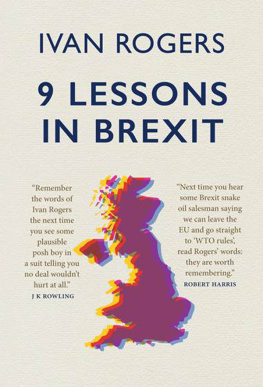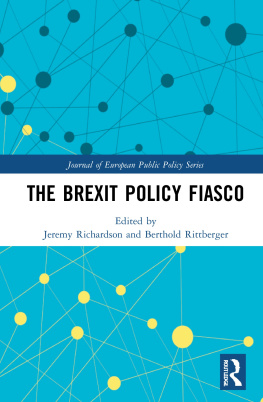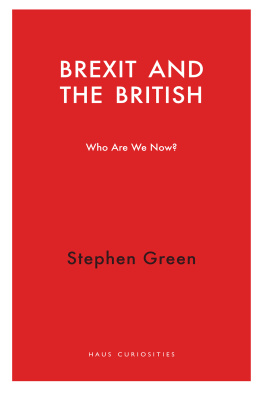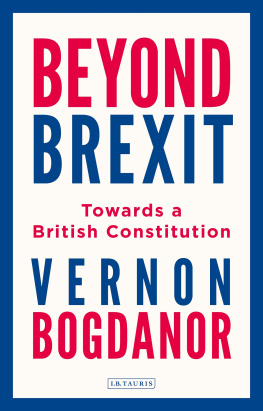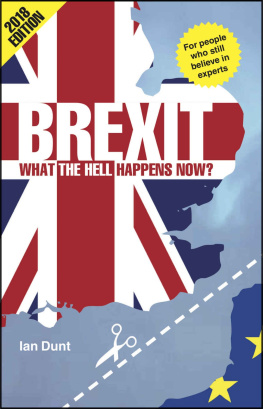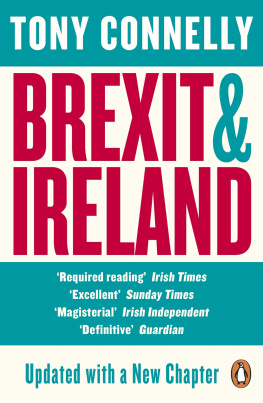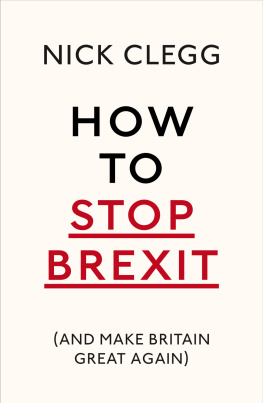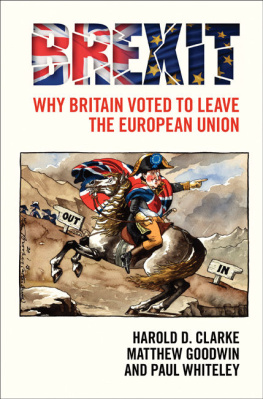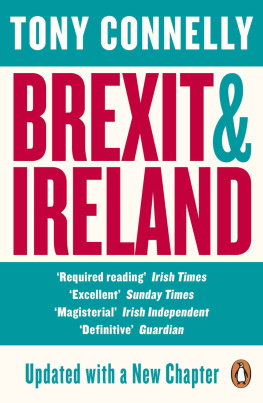9 LESSONS
IN BREXIT
Praise for Ivan Rogers
Remember the words of Ivan Rogers the next time you hear some plausible posh boy in a suit telling you no deal wouldnt hurt at all and might even be a jolly good thing.
J K Rowling
Next time you hear some Brexit snake oil salesman saying we can leave the EU and go straight to WTO rules, read Rogers words: they are worth remembering.
Robert Harris
Ivan Rogers irrefutably makes clear what an oxymoronic fantasy a managed no deal is.
Simon Schama
Rogers cuts through the guff spoken by government, ERG, Labour and pretty much everyone else.
Robert Peston
In terms of knowledge and experience of the EU, Ivan Rogers is second to none.
Lord Peter Mandelson
A timely reminder of why Ivan Rogers was not tolerated in government and why he probably should have been: clever, insightful, waspish, mordant, learned.
Tim Shipman
Political Editor, The Sunday Times
Ivan Rogers on blistering form, setting out the unpalatable truths of Brexit that effectively got him sacked as our man in Brussels.
George Parker
Political Editor, The Financial Times
At last someone is talking sense on our post-Brexit trade nightmare.
Christopher Booker
The Telegraph

INTRODUCTION
T he stakes in the Brexit process could not be higher now. We face the gravest political crisis for at least a couple of generations. The risks are both a democratic crisis and an economic one.
As a former senior civil servant I was Britains ambassador to the EU until I resigned my post in January 2017 I had a long career serving governments of all colours, mostly on international and financial issues.
I am not a politician and have never wanted to be one, and my roles rarely involved speaking publicly. Since leaving Brussels, however, what I have done is to give testimony to several parliamentary committees when they have asked me to do so, and to give lectures at a number of British universities who have invited me to speak about the implications of Brexit, and the real choices we have after leaving the EU. In these interventions I have attempted to bring evidence into a heated argument, in which evidence has all too frequently gone missing.
I am all for rumbustuous debate. Any healthy democracy needs it, and benefits from a serious contest of visions as to its future direction. Part of the problem the European Union has is that the public in several countries, not just the UK, think that too many issues which are central to their own sense of their identity are being dealt with, often by unaccountable people, in ways which they think remove their right to make real choices to change political direction.
But debates about fundamental questions of direction need to be anchored in facts, not fantasies. And ours has suffered since the referendum from a surfeit of the latter, from a near total inability to understand the interests, incentives and motives of the people with whom we are negotiating a divorce, and from what I think are highly unrealistic assessments of the potential national options ahead.
This book is an edited version of the university lecture which has resonated most widely. It offers the nine lessons that I believe we need to draw from the last two and a half years, if the next two and a half indeed the next decade are not to be even more painful.
We cannot go on as we have been: evading and obfuscating choices indeed frequently denying, against all evidence, that there are unavoidable choices. And the public will, understandably, not, for a very long time, forgive a political class which, on all sides of the divide, fails to level with it on the choices being made.
I wish I could say that I thought these nine lessons were in the process of being digested. Perhaps we do at least have some signs that a genuine debate about types of post-Brexit destinations, based on something other than complete wishful thinking, is belatedly breaking out.
But the debate in this country on all sides continues to suffer from all manner of delusions, fantasies and self-deceptions.
And the debate in the EU on the British question, insofar as there is one, suffers from complacency, fatigue and strategic myopia.
We are in a bad way. And a descent into a deeply troubled and essentially conflictual medium-term relationship with the EU, and a generation of deeply divided British politics, becomes completely inevitable unless we learn these lessons and apply that learning in the next few years.
So here are nine lessons we need, I think, to learn from the last few years, and the conclusions we need to draw from them.
1ST LESSON:
It has of course to be that Brexit means Brexit.
I do not mean this facetiously. Well, not primarily, anyway I mean that leaving the EU is genuinely a major regime change, with massive political, legal, economic and social consequences.
Being just outside the EU perimeter fence even if that is where we choose to be (which I rather doubt) is not at all similar to living just inside it, which is where David Cameron sought to entrench the UK, that is to say, outside political, monetary, banking, fiscal union, outside Schengen (the zone which has abolished passport and all other types of border control), and with a pick-and-choose approach to what used to be the third pillar of justice and home affairs. His was the last attempt to amplify and entrench British exceptionalism within the EU legal order.
It failed. A majority voted to leave altogether.
And when they did, they were not told that, at the end of the withdrawal phase of the negotiation, there would be another vote on whether they meant it, once they saw the terms. We cant rewrite the history of what happened.
Incidentally, second vote campaigners seem either remarkably coy about whether they want to remain on the terms Cameron negotiated or whether some great new offer will be forthcoming notably on free movement of people from EU elites supposedly desperate to give us something now which they were not prepared to give to Cameron.
So let me puncture that fantasy first: no such offer will be coming.
If we stayed, we could, contrary to what some allege, keep the existing membership terms.
But that includes no promise of improving them. I have yet to meet, for example, the senior person in any capital who wants to give Member States the right to impose numerical controls on free movement rights.
And this is because, among the other 27 Member States, without exception, free movement is not at all the same business as external migration.
Their crisis which is severe and extremely difficult to handle is about external migration. And for them, the British response to that crisis from both the last two Prime Ministers has essentially been: we have an opt-out from any joint action on that one. What you 27 do via common policies is up to you. Well help out with aid in the affected regions.
It still amazes me that virtually the entire British political class still thinks that its free movement preoccupations are shared in the 27.
They arent.
To come back to the fundamental choice, though, once you have decided to leave the EU, you cannot, from just outside the fence, achieve all the benefits you got when just inside it.
First, there will, under no circumstances, be frictionless trade when outside the Single Market and Customs Union. Frictionless trade comes with free movement of people. And with the European Court of Justice. More later on that.
Next page
